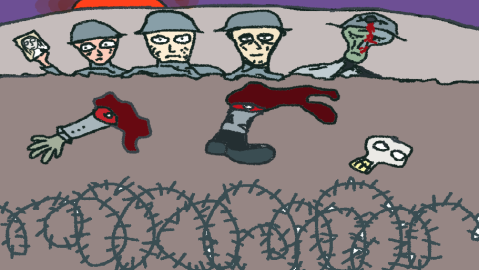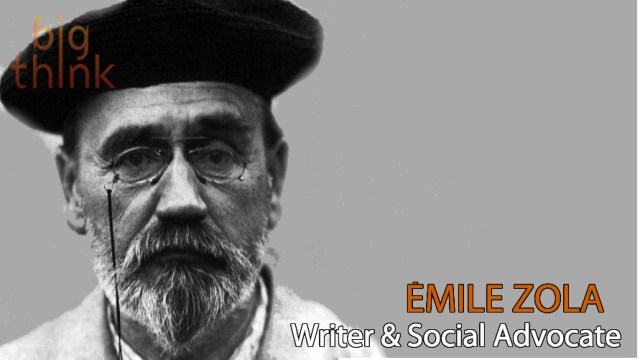We Know Nothing of War

Everybody in my country in my generation knows that war is tragic and wrong. But most of us have no idea what war really is. The way we talk about war on Facebook and elsewhere is a bit like the way white people in the suburbs talk about gang violence in the inner cities. Slow, steady shaking of the head from side to side. So sad. Oh, the humanity.
I’m not saying we’re wrong. War is terrible and to be avoided at any cost. But I’ve been thinking a lot lately about World War I — about that generation that found itself suddenly thrust into the worst horror humanity had ever managed to contrive. Millions dead and maimed on the Western front. Years spent living in trenches full of shit, piss, and dead bodies. Staring all that in the face, as much as is possible with the help of Dan Carlin’s “Hardcore History” podcast, a biography of Winston Churchill, and PJ Harvey’s song “All and Everyone,” it’s hard not to think of us as a generation of children, prancing around and fussing now and then whenever our toys get broken.
Worse, war is still with us — in Africa, in the Middle East — but until it comes and visits your house, it’s tough to really hold it fixed in your mind’s eye, an ever-present reality. Even 9/11 quickly de-rezzed into clichés. If you have to say “never forget,” you’ve probably already forgotten. Our ignorance of the reality of war affects our policy decisions abroad and the way we talk about things like terrorism.
I’ll never forget (really. no reminders necessary) a dinner party I once attended at the home of an Israeli friend, a guy maybe 10 years older than me who had lived most of his life in Jerusalem. The topic turned to the first intifada — a series of Palestinian terrorist attacks (or acts of resistance, depending on whom you talked to) in Jerusalem and Tel Aviv, still ongoing at the time.
I don’t know what I said — some mitigating and semi-informed comment about how both sides had been locked in this struggle for so long that they couldn’t see anything clearly anymore, and that enough was enough, I think.
My friend exploded. What he said isn’t so important — he was predictably pro-Israel and anti-terrorist, and deeply invested in the blood that had been spilled and who had “started” it all.
What mattered was the wave of alienation that hit me: the sudden, disorienting sense of having no idea what the hell I was talking about, sitting here, safe, in this Brooklyn brownstone. Not that my friend was clear-headed about the conflict — he was anything but. But he had lived it, whereas to me it was a remote irritation, a stupid, endless spat I’d heard enough of in the news and wanted an end to, already.
PJ Harvey’s song randomly came on the car radio this morning. iPhone –> Bluetooth –> automatic iTunes play –> alphabetical order. “A” for “All and Everyone,” from her brilliant album Let England Shake. When we think of World War I we think of gray skies and men shuffling stoically to their doom. The song doesn’t contradict that image:
Death was everywhere,
In the air
And in the sounds
Coming off the mounds
Of Bolton’s Ridge.
Death’s anchorage.
When you rolled a smoke
Or told a joke,
It was in the laughter
And drinking water
It approached the beach
As strings of cutters,
Dropped into the sea and lay around us.
But somehow she sings the soul into the scene, the sorrow and the loss at the waste of young life that you can’t quite feel when staring at black-and-white photographs.
Death was in the ancient fortress,
Shelled by a million bullets
From gunners, waiting in the copses
With hearts that threatened to pop their boxes,
As we advanced into the sun
Death was all and everyone.
Listening while dropping my 7-year-old off at his school bus (don’t call Child Protective Services. He wasn’t paying attention to the lyrics), I felt that sickly ache in my gut that men must have felt in those trenches: despair and nausea mixed with some tincture of remote hope that they might eventually get out of this hole in the ground and home to their families.
Dan Carlin’s podcast is different. In his series on WWI called “Blueprint for Armageddon,” he’s aggressively masculine, presenting the horror of war in the form of graphic, grim descriptions of dismemberment and decapitation, and of battle strategies gone horribly wrong, or horribly right. Carlin seems to understand war’s full impact well, but he’s strident in describing it, raising the sneaking suspicion (in this listener at least) that he relishes putting his listeners through something of the same hell the soldiers suffered.
This is the same thing in a different form: a way of giving you something not totally unlike the experience of war through the snug comfort of your earbuds. Maybe Carlin, like any serious student of history, is irritated, pissed off even, by the ahistoricity of our times. Maybe he’s punishing us, just a little, for our own good. “Blueprint for Armageddon” drops you in the middle of the conflict, the most nauseating charnel house in history, providing rich, vivid detail and insightful commentary, but letting you draw your own emotional conclusions.
I know what most of my friends and acquaintances think of Churchill, whether or not they really know anything about him. I won’t say I’m a fanboy, exactly. But he was there, on the Western Front, and more than you or I do, he understood what war was and what it cost. In fact, he spent most of the years between WWI and WWII trying in vain to convince people in the British government that Germany was mobilizing again, building planes and warships in violation of the Treaty of Versailles, and that Britain had better do something about it before the imbalance of power resulted in millions more lives lost (in the coming war) than would otherwise have been.
Nobody listened to him. England had been so traumatized by WWI that nobody wanted to hear anything about war at all. Churchill was called a “warmonger” and marginalized politically while Germany rearmed aggressively with the full knowledge of the British government, who assured the British people that Germany was simply stretching its legs a little, and who could blame them for that?
Some will no doubt disagree, but I’d argue that Churchill, having known war intimately, was England’s best advocate for peace at a moment in 1933 when the Oxford Union — the nation’s most influential organization of young men — passed a formal resolution that “This House would not in any circumstances fight for King and Country.”
I’m not arguing that a strong military is the only deterrent to war. I don’t know enough about history or diplomacy to convince myself or anyone else of that. But I do think that those of us who haven’t had war come visit us on our doorsteps need to do a lot of work before we’re in any position to advocate effectively for peace. Social theorists argue that history, having been written by men and by the victors, is inevitably and overly focused on war. I’d agree that there are many histories to be told, and that we need to tell them. Literature does a better job, often, than historians can of telling the forgotten stories at the center and on the periphery of human events (Hilary Mantel’s Wolf Hall trilogy being one brilliant, recent example).
But war, I think, IS central to human history, hideous though it may be for us to stare it in the face. It reveals so much about what we are at our best and at our worst. And I think we gloss over its gory details at our peril.
—
talk to @jgots on Twitter
. . . and — HEY! — episode 1 of Think Again – A Big Think Podcast is LIVE on iTunes, Soundcloud, and elsewhere. Jason Silva guests and Jason Gots hosts.





